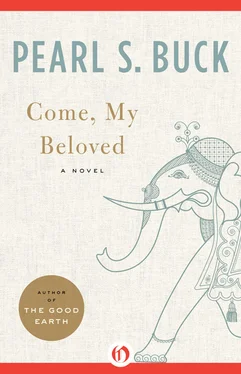And now Jehar!
If the Indian people were touched enough with unreality so that they could follow a fanatic, their ignorance was still appalling and he had begun to see that all he did would not be soon enough to save the country, because Gandhi had lighted such a flame.
And now Jehar!
With Empire his work, too, would collapse. The millions of ignorant peasants in the villages could not soon enough be taught or their poverty relieved to save the day for Empire. The task should have been begun three hundred years ago, if Empire was to hold. He knew now that his own student body was rotten with disloyalty. He tried not to know it, but the secret meetings, the private slogans, the Gandhi caps and the homespun cloth were conspicuous. If Gandhi won, then the Christianity upon which he had built his life was only shifting sand. And Ted had today defied him, as yesterday Jehar had defied his own father. Oh, the cruelty of sons to their fathers!
There on his knees while his thoughts prevented his prayers, he suddenly remembered his own youth. So had he defied his father, and his whole life had been a defiance and still was. That aged man lying bedridden now in the old mansion, he had deserted, too, in his own fashion. The tears rushed to his eyes.
“God, let me go back to my father and explain to him—”
It was not at all the prayer he had planned to make.
“Have I been wrong, O God? Should I have obeyed my earthly father instead of Thee? Am I punished now in my own son? Give me wisdom that I may know what to do.”
He knelt there for a long time, waiting, but no answer came, and he got up from his knees. It had been long since he had been aware of any answer to his prayers. Somehow without knowing it he had lost the sense of the presence of God, even while he spent his whole life in that service. Loneliness descended upon him again, the awful loneliness of the spirit. When Olivia died he had known loneliness and in a sense he had never learned to live without her. But the loneliness then was not absolute, as this was. He had not given himself to Olivia as he had to God. Involuntarily he groaned aloud the cry that once Christ had made, “My God, my God, why hast Thou forsaken me?”
But why, but why?
Ted strode from the drawing room down the hall to his own room and closed the door silently and then stood motionless. His heart was beating with joy! Wave after wave of joy, astounding joy, whose source he did not know except that it came from outside himself, infused his being. It filled him like an atmosphere, cooling and invigorating. He laughed aloud, he felt the hair prickle on his head and his fingers tingled. He wanted to run and leap and dance. Yet why except that there alone in the drawing room when he had seen his vision, he had reached a decision so clear that it was absurd not to have known before that it was inevitable. He must leave Poona and go and live in a village. How simple a resolution, but he had been struggling toward it all these months since he had seen Darya, and only Jehar’s directness and childlike purity had led him to the end.
“Why should I follow my father’s footsteps? I must leave him so that I can live alone with India and myself. There was that little village in the north that I liked so well. That is where I shall live.”
He stood enraptured with the thought. Hindu saints, like ancient Christians, were acquainted with the state of ecstasy, and this, he supposed, was what they meant. When a decision was right, because it was the will of God, or perhaps only because it fulfilled the soul’s deepest unspoken desire, then such ecstasy was the confirmation, a powerful happiness, an accord which was complete.
He sat down quiescent, wondering and grateful, and after a time the joy subsided and peace remained. He made plans, he thought of the village, Vhai, and of all that he could do there — yes, and receive. He would go there humbly to learn as well as to teach.
“I CANNOT UNDERSTAND YOU,” David said.
“I don’t expect you to, Father,” Ted replied.
They sat at dinner together that night in the orderly house. His father looked exhausted. The heat had risen unbearably during the day and the monsoons were due at any hour now, and would probably begin before midnight. Meanwhile the air was fetid. Neither of them could eat and they made no pretense. The languid servant removed their plates and brought in coffee.
“Does this decision mean that you have given up the thought of marriage?” David asked.
“No, not if Agnes will come to the village with me,” Ted said.
“I hope you will not be so inconsiderate as to ask her,” his father replied severely.
Ted laughed. In spite of the heat he had continued singularly lighthearted all day. He had busied himself with packing a few of his things, a change of garments, some books, a cooking kit, an army cot and a mosquito net. When he got to Vhai, he would build one of the mud-walled houses with a thatched roof. There was no reason for delay now that the school year was over.
“Does it seem laughable to you?” his father asked drily. Humor between the generations was perhaps impossible. He remembered the jokes which his father used to tell and laugh at loudly which even in his youth had seemed to him childish and certainly not funny.
“Not at all,” Ted said gaily, “but I suppose Poona was rather remote when my mother came to marry you.”
“It was not the same,” his father retorted. But he did not explain how it was. Instead his mind busied itself suddenly with an inspiration. Why should not he write to Agnes Linlay and beseech her good sense for his foolish son? Let it be a secret between them, let him convey to her delicately how happy he would be if ever she became his daughter-in-law. He could praise his son honestly to several ways, and then hint that though he was extremely young and could benefit the more from a sensible wife, yet he felt he could promise that she need never regret her choice, if now Ted could be kept from an unwise decision to go and live in an Indian village, an act which must somehow be prevented by his family and his friends. There were proper ways for a white man to live in India and she above all young women perhaps must know this and could help to save Ted from folly.
“I shall just drift off in a day or two, Father,” Ted was saying cheerfully.
“I am surprised that you have let Jehar so influence you,” David said.
“It is not Jehar alone,” Ted said. It is even partly Darya. Most of all it is my own wish just to strip off everything that you and Grandfather have given me, though I am grateful to you both and must always be, and yet I want to be only myself at least for a while — not a MacArd, perhaps.”
David did not reply. He was haunted by this morning’s memories of his own youth and he could not speak without seeming to echo his own father twenty-five years ago. He must rely on Agnes Linlay.
Their meal was interrupted by a commotion on the veranda and the announcement that Fordham Sahib and Memsahib were waiting.
“Ask them to come in,” David told the manservant. They came in not two but three, and the third was a young girl, a girl with a face as fresh as a pansy, and indeed very like a pansy, the large soft brown eyes and thick soft brown eyebrows, full red mouth and pointed chin combining the effects of that simple flower. She was extremely pretty and childlike, and Mrs. Fordham introduced her with bursting pride.
“Our daughter Ruthie, Dr. MacArd, and this is young Mr. MacArd, Ruthie. Do forgive us, but we couldn’t wait.”
“She’s come, has she?” David said, essaying a smile. He had forgotten and so, he supposed, had Ted, that Ruthie was to arrive.
Читать дальше












